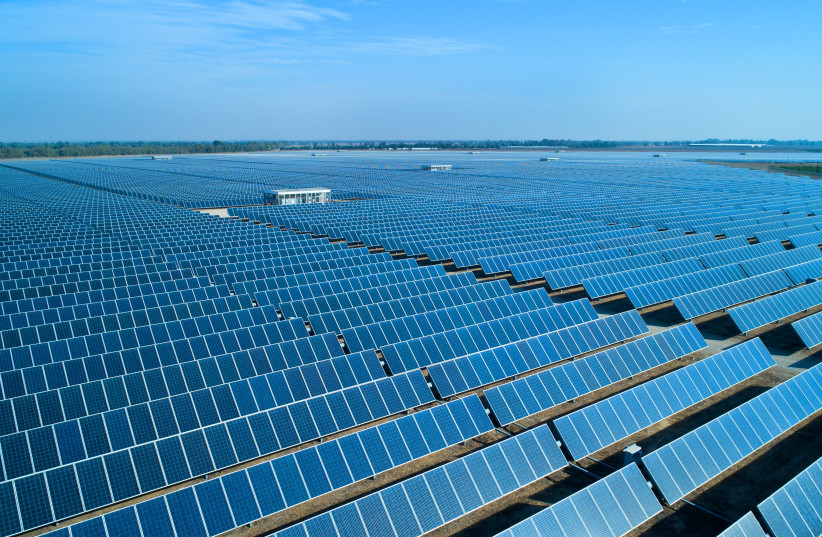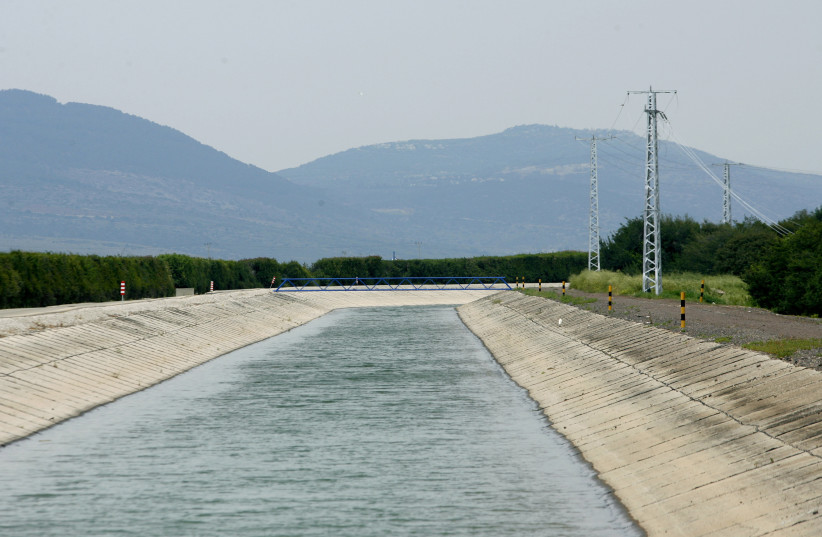Water and sun are winning combination for Mekorot

‘Every shekel Mekorot saves is being invested back into the water market’
Why is a water company building solar fields across Israel?
Mekorot, Israel’s national water company, has been diving into the deep end of clean energy consumption as of late – a move that could hold all types of positive implications for Israelis and the country’s economy.
Founded in 1937, Mekorot is a government company listed on the Tel Aviv Stock Exchange that provides Israel with 80% of its drinking water and 70% of its overall water consumption.
As the company progressed throughout the years, it became a world leader in big data, energy management, water quality and cyber protection, with innovative developments that work well and have proven themselves in the field.
Within the energy sector, Mekorot is installing solar energy infrastructure over top of its already existing reservoirs, spread far and wide throughout the country.
Annually, Mekorot uses and disseminates 2.2 gigawatts of electricity throughout Israel using traditional means of harnessing energy, such as fossil fuels and hydropower. Behind the security department, the IDF and possibly the Palestinian Authority, Mekorot is considered the largest civil energy consumer of electricity in Israel, using 4-5% of the total national demand. As a private party, however, it is the largest in the country, with an annual electricity bill that comes in at around NIS 1 billion each year.
“That is a lot of money, which provides a lot of motivation to pursue [avenues] of efficiency and better operational methods to reduce the [overall] electricity bill,” said head of the Business Unit at Mekorot Barak Graber.
Graber explained that generally, the water sector in Israel works under a specific tariff system, in which one can direct local demand according to the national electricity demand – pay less when the demand is low and avoid using electricity whenever the demand is at its peak.
Thus, the peak hours are between 8 a.m. to 4 p.m, which is when Mekorot tends to do the bulk (64%) of its work. As part of its efforts to cut expenses, Mekorot saw an opportunity.
Knowing that the company is one of the largest energy consumers in the country it “realized now with a very unique mindset” that it could also be one of the largest providers of solar energy in the country, Graber explained.
Furthermore, if the company can provide an alternative electricity source that could allow them to operate during the day at lower costs, then Mekorot could “save a lot of money” for both Israelis and the company as a whole, in addition to bringing the Jewish State into the realm of relying on clean energy.
WITH WATER consumption and electricity expenditures becoming larger for the company year after year, Mekorot decided to tap into the solar energy market to align with its objective to become a more efficient consumer and provider of electricity and water in Israel.
To address the needs, of the state and that of the company, Mekorot commissions Israeli tech entrepreneurs specializing in energy projects to install solar panels that float on top of its reservoirs, sort of like a barge, with the hopes these sorts of projects will lead to lowering energy costs and eventually turn Israeli energy consumption completely green within the next five to 10 years.
“It is a floating solar device. The solar panels as you see on the rooftops, in farms or on buildings, but they are built on a buoy or a floating device that sits on the reservoirs,” Graber said. One of the advantages of this project is “the reuse of the land or the water, otherwise it would only have been used for water supply needs, now we can provide electricity with it.”
This type of methodology, the reuse and improvement of existing infrastructure and technologies – in this case, the reservoirs – and formulating them to address the particular needs of Mekorot, is a common theme among the multitude of technologies being pioneered by the national water company.
The methodology has a wide range of benefits for the specific solar project itself. To start off, using the reservoirs removes the need for Mekorot to buy extra land to build these solar fields on top of, and with land being worth far more than gold or diamonds in this small country, the cheeky innovation cuts the cost of the project astronomically.
“As you know, Israel is a very small place; for let’s say the reservoir in the Gush Dan region, we have a thousand dunams of reservoirs like this that we can cover with solar panels, in the middle of Israel,” Graber said. “If you take the equivalent thousand dunams in the middle of Israel [for purchase] then you raise the cost of living [for the entire country], and it’s a big problem in Israel.”
The solar fields and the reservoirs also share a mutually beneficial relationship, whereas the solar panels cool down the water and prevent water from escaping due to evaporation, and vice versa, where the water cools down the solar panels.
This increases efficiency while decreasing the costs it takes to operate the fields and also lowers the price at which Israelis buy their water or energy. This holds all types of positive implications for the cost of living for Israelis in general, and even those living in remote sections of the country.
IN ADDITION to solar electricity, Mekorot is currently involved in other branches of technical efficiency in electricity as well, including the use of hybrid generators, hydroelectricity and engaging with start-ups that can create the possibility of using hydrogen to power the national water company.
The main activity in Mekorot’s push to go green lies within solar electricity, however, and the potential it holds to lower costs for the company throughout the peak daytime hours.
Like Mekorot does with its desalination plants, it allows entrepreneurs to obtain tenders and certificates to operate and manage the solar sites, normally for up to 25 years.
With the desalination plants, the entrepreneur is typically responsible for desalinating and selling the water to the government of Israel, as well as maintaining and operating the site – paying Mekorot mainly for the land use and within the agreement for the solar field sites Mekorot holds the opportunity to buy cheaper electricity from the site operator.
“Every shekel Mekorot saves is being invested back into the water market,” Graber said. “Mekorot is a fully governmental company where all of its profits are being invested back into the water sector.”
In addition to the cost effects, Mekorot holds the opportunity to completely shift the entirety of its energy consumption to clean green energy solutions within the next decade.
Mekorot believes that its total potential for producing solar energy ranges from 1-1.5 gigawatts of electricity annually, Graber said, considering all the entrepreneurial tenders currently delved out, those currently implemented and others still in the works. Should Mekorot succeed in producing 1.5 gigawatts of electricity via solar methods, it alone would increase all current national solar production by 60%.
At the high end, this would transfer over and account for 68% of Mekorot’s total electricity output, making the company nearly self-sufficient with regards to energy production and usage.
“We are trying to bridge the gap between 1.5 and 2.2 [gigawatts] by other means, hi-tech means, AI and machine learning [capabilities]... unique operating systems and we are pursuing a goal of producing 1.5 gigawatts of solar electricity,” in order for the company to cease being a fossil-fuels-oriented utilities company, Graber said.
“If we are talking optimistically, I believe we can [go completely] green within the next five to ten years,” Graber added. “We currently have three large tenders on the way that roughly covers around 900 megawatts [of electricity], but the rest are a bit more complicated and require more regulatory assistance from the government to become operational.
“However, the government of Israel and the Energy Ministry set a very ambitious but achievable goal for solar energy, and Mekorot is an operational branch of the ministry, which is doing its best to try and fulfill this goal,” said Graber.
This article was written in cooperation with Mekorot.
Jerusalem Post Store
`; document.getElementById("linkPremium").innerHTML = cont; var divWithLink = document.getElementById("premium-link"); if (divWithLink !== null && divWithLink !== 'undefined') { divWithLink.style.border = "solid 1px #cb0f3e"; divWithLink.style.textAlign = "center"; divWithLink.style.marginBottom = "15px"; divWithLink.style.marginTop = "15px"; divWithLink.style.width = "100%"; divWithLink.style.backgroundColor = "#122952"; divWithLink.style.color = "#ffffff"; divWithLink.style.lineHeight = "1.5"; } } (function (v, i) { });


